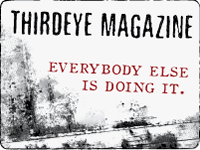Three primates died today while traveling in a motorized vehicle in an arid region between the Tigris and the Euphrates rivers. Although we can state nothing with absolute certainty, the three “humans” — basically hairless, cognitively advanced monkeys with a striking genetic similarity to the common chimpanzee — were most likely killed by some sort of explosive device as it incinerated the vehicle beneath them. Over six thousand miles away, another primate of the same species claimed that those killed were members of a group he called “The United States Army.” Upon further investigation, membership in this “army” is marked chiefly by clothing, as well as by certain behavioral traits. The exact purpose of the army’s presence in the region, called “Iraq” by some, is under fierce debate.
In contemporary sociopolitical discourse, much is made of taking an “objective” view. To allege that a media report is “not objective” is to strike at the very heart of the journalistic integrity of its authors. If by objective, however, we mean independent of peoples’ opinions, beliefs, attitudes, and feelings then in an ideal world of “objective” reporting, all news reports would look a lot like the one above.
This is not an introduction to an argument about the inescapable subjectivity of claims like “The U.S. is winning [or losing] the war in Iraq.” The view suggested here cuts deeper than that, down to a level that questions exactly what makes the U.S. the U.S., or Iraq Iraq, or a war a war. Objectively, we cannot say much about the happenings in Iraq other than that humans are riding around in jeeps, searching houses, firing weapons, and making and deploying bombs, but also washing clothes, cooking dinners, trading special bits of paper for food, and carrying out innumerable other commonplace things. To include or exclude any of these activities from under the umbrella of a larger activity called “war” is a matter of opinion, perspective, and consensus.
AN AGREED UPON FICTION
Like war, many things would not exist without the beliefs, opinions, and attitudes directed toward them by humans. Consider the concept of a dollar, which exists only in the minds of a certain group of people. That a particular piece of paper is worth one dollar is true only because the members of the group agree that it does. The piece of paper itself, on the other hand, exists independent of human attitudes; it simply is. This distinction was popularized by philosopher John Searle in his 1995 book The Construction of Social Reality. Searle calls things like money, governments, and baseball teams “social facts” or “institutional facts,” whereas things like rocks, trees, and the snow on top of Mt. Everest are “brute facts” of reality.
Nowhere are social facts more fundamental and less obvious than in schemes of categorization and identity. This may be due in part to the physical correlates of social distinction – such as a uniforms, badges, or melanin counts – which can trump nearly anything; as when different colored uniforms allow brothers to fight on opposite sides of civil wars. Still, these markers require social mechanisms — and, most importantly, agreement — to be recognized. I can wear pinstripes and a hat with a New York Yankees logo on it, chew tobacco, and earn way too much money, but for me to be a member of the Yankees, society must agree that: 1) a certain set of activities, rules, and behaviors comprises a game called “baseball,” 2) a complex set of associations forms an organization called “Major League Baseball,” 3) there exists a region with arbitrary boundaries on the Eastern seaboard called “New York City,” 4) that city has a Major League baseball team called the Yankees, and 5) I am a member of that baseball team. If any of these conditions are not met, I cannot be a member of the Yankees.
INVISIBLE WORLDS
Observing a behavior without an understanding of the social facts underlying it can make the behavior look absurd. Consider, for example, someone without an understanding of traffic laws watching the driver of a car sit patiently at a quiet intersection while waiting for a light to change, or someone unfamiliar with token economies seeing a shopper exchange an intrinsically useless stack of green paper for a basket full of food (even more perplexing, think about how much people can freely take just by swiping a plastic card through a plastic machine). It is easy to see how incomplete cultural knowledge could be to blame for any number of unfortunate happenings throughout recent history, such as the West’s frequent mislabeling of other cultures as backward, primitive, or inferior.
Most American citizens obey the law against murder as closely as they do the law of gravity.
These misunderstandings happen because social facts are very difficult for the average person to distinguish from brute facts. To explore how well individuals naturally recognize this distinction, I conducted a small study where I asked subjects to sort concepts into two equal groups using whatever criteria they chose. The concepts were selected such that their social construction vs. brute nature should have been the most obvious distinction, but subjects repeatedly went out of their way to fit them into more familiar, less logical groupings. Even after I explained the social vs. brute distinction to the subjects, 90 percent performed very poorly when asked to divide a new set of concepts into two groups on that basis.
Subjects in the study are not alone in their ineptitude. Each day, media outlets peddle “unbiased” reports rife with culturally variable opinions, while religions treat social beliefs about adultery, theft, and marriage as natural law. Most American citizens obey the law against murder as closely as they do the law of gravity.
The latter are wise to do so, though, since nowhere can one claim that social facts do not affect reality. On the contrary, social facts have enormous real world impact. The border between Afghanistan and Pakistan may have been scribbled by a British mapmakers’ pen, but very real consequences can result from crossing it. Murder may be considered wrong only because we believe it is wrong, but those found guilty of it find themselves in very real prison cells, or worse. Such consequences depend upon the society’s agreement to uphold or affirm the social fact. The moment that the consensus changes, the social fact ceases to have force, and the consequences for defying it vanish. The same happens if the institution that grants the fact its force collapses. As movies are fond of showing, after a society falls, a suitcase full of its currency can’t buy a thing.
OUR GIANT HOUSE OF CARDS
Social organizations, particularly military and religious groups, go to great lengths to make their abstract rules concrete. Oaths, devotions, codes, and chants are specifically designed to reinforce artificial boundaries and hide the fragility of the ties that bind the group. Such efforts could not succeed, however, without the average person’s aforementioned inability in distinguishing the socially constructed from the “really real.” History has offered clear, unmistakable examples of the fragility of entities bound by social facts — most notably the ever popular “regime change” — but those examples are forgotten, permitting an unwavering confidence in the brittle buttresses of social institutions.
Along these lines, we somehow forget stories about Muslims, Christians, and Jews living side by side in a Baghdad neighborhood, or national armies composed of all creeds and ethnicities, when we unquestioningly accept the implication that because the tensions in the Middle East are ancient they are basically unresolvable. In reality, little but ideas separates Palestinian from Jew, or, for that matter, American from Iraqi. Yet the entire global economy rests on these delicate little notions of identity, borders, meaning, and value, oblivious to the fact — to the brute fact of reality — that a few changed minds could make it all come tumbling down.





No Comments so far ↓
There are no comments yet...Kick things off by filling out the form below.